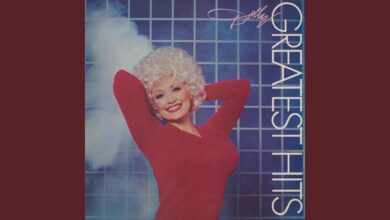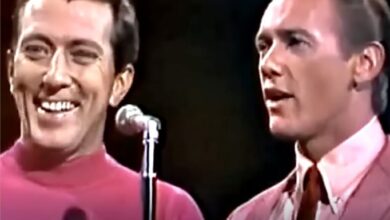Tammy Wynette’s “Stand By Your Man” Shakes the Foundations of Country Music and Becomes a Cross-Genre Lightning Rod in 1968
In 1968, when the tides of American culture were shifting rapidly, Tammy Wynette released a ballad that would split public opinion and, paradoxically, unite millions through its raw emotion and haunting melody. “Stand By Your Man” wasn’t just a song—it was a declaration, a confession, and a cultural mirror. Co-written by Wynette and legendary producer Billy Sherrill, the song rose to number one on the country charts and crossed over to the Billboard Hot 100, peaking at No. 19. It was both embraced and criticized, but ultimately, it cemented Wynette’s place in music history as the First Lady of Country Music.
Tammy Wynette’s ascent was far from effortless. Born Virginia Wynette Pugh in rural Mississippi, she worked as a hairdresser and single mother before chasing music full-time. Her early life of poverty and perseverance bled into her voice, imbuing it with an aching sincerity that no studio trick could replicate. Wynette wasn’t just another Nashville hopeful—she was the voice of countless women whose lives never made headlines. When she sang, it was less about polish and more about pain wrapped in beauty.
The story behind “Stand By Your Man” is almost as iconic as the song itself. In a whirlwind writing session that reportedly took just 20 minutes, Wynette and Sherrill birthed a track that would speak volumes—both intentionally and unintentionally—about love, loyalty, and expectation. Sherrill had originally doubted the line “Stand by your man,” fearing it sounded too controversial or old-fashioned. Wynette, however, insisted on keeping it, intuitively sensing its power. Ironically, she would later go through five marriages, adding a complex layer of contrast to the sentiment she so powerfully conveyed.
The recording session at Columbia Studio B in Nashville was pure countrypolitan—Sherrill’s signature style. With lush strings, pedal steel guitar, and Wynette’s trembling yet resilient vocal performance at the center, the song became an anthem that was more cathedral than honky-tonk. Sherrill layered the arrangement with elegance, allowing Wynette’s voice to soar without ever sounding overproduced. The production captured both vulnerability and strength, creating an emotional paradox that made the song unforgettable.
Upon its release, the song soared to No. 1 on the Billboard Hot Country Singles chart and held that position for three weeks. It also achieved a rare feat for a country song in that era—it broke into the pop charts, signaling a major crossover moment. It became Wynette’s signature song and earned her a Grammy Award for Best Female Country Vocal Performance in 1970. Yet its rise wasn’t without backlash; feminists criticized it as submissive, while traditionalists embraced it as a moral compass.
Culturally, “Stand By Your Man” arrived at a volatile moment. America was in the throes of the women’s liberation movement, and the song became a lightning rod in that discourse. While some saw it as reinforcing outdated gender roles, others heard in it a deeply personal tale of devotion and endurance. The conversation it sparked helped shine a national spotlight on country music’s ability to participate in social dialogue—not just through protest songs, but through intimate emotional storytelling.
The success of “Stand By Your Man” elevated Wynette from a rising star to an icon. She was suddenly in demand across television, radio, and international stages. The song opened doors far beyond Nashville, leading to performances in the UK and appearances on mainstream programs like The Tonight Show. It didn’t just make her a household name; it made her a symbol—complex, celebrated, and debated.
Beyond its immediate impact, the song shaped the sonic and thematic direction of country music. Its polished production helped usher in the Nashville Sound era, where strings and pop elements softened traditional twang. Meanwhile, its lyrical vulnerability inspired future female artists—from Reba McEntire to Carrie Underwood—to explore emotional honesty in their own storytelling, even when the themes proved controversial.
“Stand By Your Man” was covered and interpreted by a wide array of artists. Country singers like Dolly Parton and Lorrie Morgan offered reverent tributes, while artists outside the genre—including Elton John and Patti Page—put their own spin on it. Perhaps most famously, Hillary Clinton referenced the song during her husband’s 1992 presidential campaign, joking, “I’m not sitting here like some little woman standing by my man like Tammy Wynette.” The line, and the media storm it caused, reinvigorated the song’s visibility and sparked renewed public interest.
Tammy’s life was no less turbulent than the lyrics she sang. Around the time of the song’s peak popularity, she married fellow country star George Jones, and their tempestuous relationship only deepened her artistic persona. As their duets climbed the charts, audiences saw in them both the romance and the struggle that “Stand By Your Man” implied. Personal pain became public narrative, and Wynette’s credibility as a truth-teller only grew stronger.
Decades later, the song remains a cornerstone of country music’s golden era. It’s been preserved in the National Recording Registry by the Library of Congress for its cultural significance. Radio stations across the globe still play it, and its instantly recognizable chorus continues to provoke discussion and admiration alike. It has transcended its initial context to become a lasting emblem of emotional resilience and complicated love.
Looking back, “Stand By Your Man” helped redefine the boundaries of what a country song could be—not only musically but ideologically. Its production values laid the groundwork for more orchestral and pop-infused country records. Its willingness to provoke emotional and social conversations challenged the notion that country was apolitical or purely traditionalist. It proved that a ballad could carry more than a melody—it could carry meaning.
Though Tammy Wynette passed away in 1998, her legacy has only expanded. Posthumous honors have included her induction into the Country Music Hall of Fame and multiple retrospectives celebrating her groundbreaking role in the genre. “Stand By Your Man” continues to appear in films, TV shows, and retrospectives, ensuring that her voice echoes long after her final performance.
Ultimately, “Stand By Your Man” is not just remembered for the controversy or acclaim—it is remembered because it captured something undeniably human. Love, pride, pain, compromise—Wynette sang it all in under three minutes. In doing so, she didn’t just stand by her man; she stood by her truth. And in the process, she gave voice to millions who might not have known how to say it themselves.



